[ad_1]
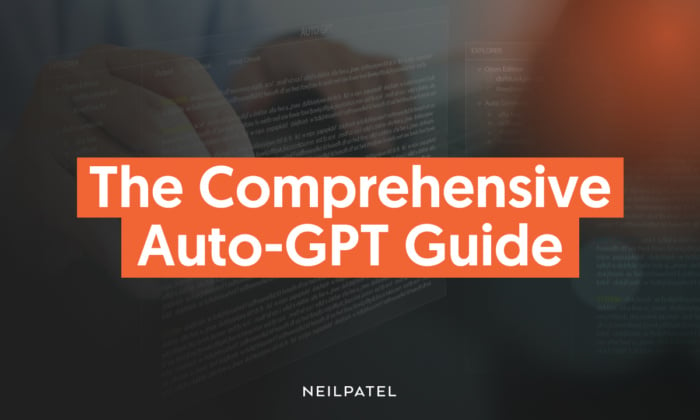
Sometimes it seems everyone’s talking about AI tools, right? More recently, it’s been all about ChatGPT and its SEO, content creation, and coding capabilities. Google have also stepped into the arena with Bard AI, their AI conversational chatbot.
However, there’s an even more powerful AI model that could steal its shine.
It’s called Auto-GPT, and it’s kind of like ChatGPT on steroids. It’s a cutting-edge, AI-powered tool that can revolutionize our day-to-day tasks and automate them.
As marketers, that sounds like a dream come true, doesn’t it?
Of course, this latest development in the ever-changing world of the AI chatbot market is just part of the story.
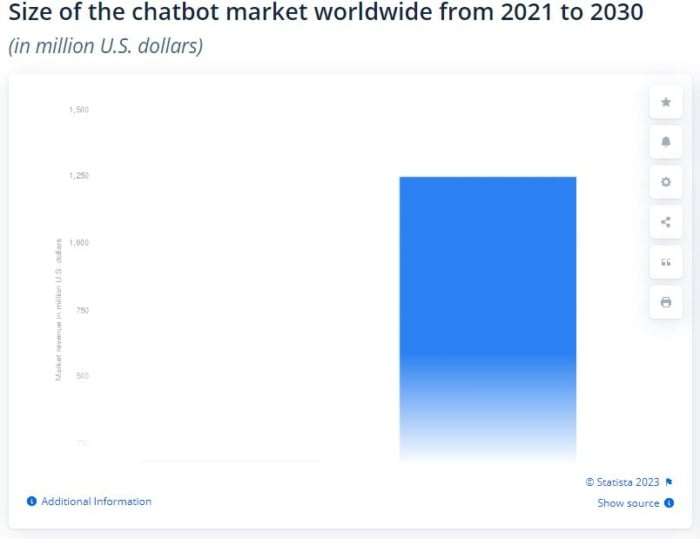
By 2025 the chatbot market is on course to reach 1.25 billion dollars, according to Statistica. Beyond that, AI is expected to become more advanced and prevalent in our daily lives.
One certainty is that chatbots and AI aren’t going anywhere, and each new development will be more sophisticated and powerful.
That brings me nicely to Auto-GPT.
Ready to learn more? Let’s start with an explanation.
What Is Auto-GPT?
Auto-GPT is a chatbot built on GPT-4 (the fourth version of OpenAI’s language model).
You can use it for various tasks and applications. Think of it like a Swiss Army knife for natural language processing!
Whether you’re a writer looking for inspiration, a marketer seeking to create compelling content, or even a student needing assistance with your assignments, Auto-GPT works just like a personal assistant.
It can help generate ideas, develop catchy headlines, or suggest improving your writing.
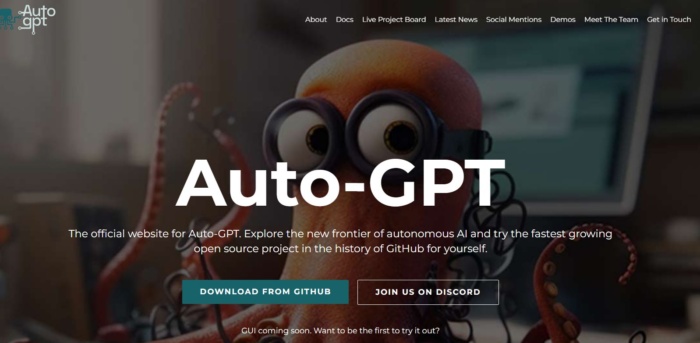
Basically, you can give Auto-GPT a project, and it takes the necessary steps to finish the task.
Just create a task name, give it a role (For instance, assuming the role of the owner of a new start-up), and give it a maximum of five goals. For example, you could use Auto-GPT to:
- Develop chat prompts to engage customers. This can help increase sales, customer satisfaction, or conversions.
- Streamline and automate day-to-day tasks. Auto-GPT can manage email responses, customer support responses, or social media content for you.
- Integrate Auto-GPT with other technology platforms or tools to create new, natural language processing applications like content creation.
Some compare it to an intern that can assist your business with simple tasks where you provide a final goal or list of goals, and Auto-GPT does the rest.
You can do plenty of cool things with Auto-GPT, which I’ll get into later.
How Does Auto-GPT Work?
Auto-GPT is a natural language processing model that learns from its own generated content to enhance its language capabilities.
Behind it are powerful hardware, sophisticated algorithms, and a lot of data processing capability.
When you give it a goal, it breaks it down into small tasks to reach its final aim.
Rather than needing prompts, Auto-GPT can self-generate them as it works towards completing a project.
The more input Auto-GPT gets, the better its performance and responses become.
Although it’s got remarkable abilities, Auto-GPT isn’t perfect. Sometimes, it may generate responses that aren’t accurate,
This happens because Auto-GPT relies on the input data it receives during training, which might have flaws. This can be a problem for businesses relying on Auto-GPT for important customer interactions or decision-making processes.
Auto-GPT can also cost you a small fortune as it sometimes takes multiple prompts to complete a project.
Auto-GPT vs. Chat-GPT
As I detailed earlier, Chat-GPT and Auto-GPT use GPT-4.0 and the Open AI platform as their building blocks, but both have different functions and applications.
Here are the main differences.
Auto-GPT:
- It’s open-source. (includes a source code so developers can enhance or modify the software)
- Auto-GPT works independently
- It’s multipurpose
- Takes time to generate content
- It can ask questions
- Long-term and short-term memory
Chat-GPT:
- Not open-source
- Relies on prompts rather than working autonomously
- It is a conversational bot for use with chatbots, etc.
- More efficient
- Generates conversational responses with users
If you want a tool that works independently, then Auto-GPT would be a natural choice. For more conversational-based tasks, Chat-GPT would be the way to go. In addition, Chat-GPT has fewer logistical barriers to entry.
What Can You Use Auto-GPT for?
There isn’t much that Auto-GPT can’t do, especially for those everyday tasks creatives face.
Here are some things you can use Auto-GPT for:
- Content Generation: Struggling to get words on the page? Or perhaps you’re just running short on time. Let Auto-GPT come to the rescue. For example, you could tell Auto-GPT you want to create content to help convert a B2B client. In response, it could develop blogs, articles, educational or instructional content, or emails.
- Language Translation: Need a quick translation? Then ask Auto-GPT to translate technical documents or scientific reports. You could also ask it to translate website content for international markets or to develop a multilingual chatbot.
- Coding: Your lack of coding experience needn’t hold you back. Just provide Auto-GPT with your needs, and it’ll generate code snippets for you. For instance, you could instruct Auto-GPT to create a chatbot.
- Answer questions: For definitions, explanations, or research, ask Auto-GPT. You could automate customer service by getting Auto-GPT to answer frequently asked questions. Or ask it to interpret data/research. Ensure you check the responses for accuracy, though.
- Get creative: if you’re searching for inspiration, Auto-GPT is your new BFF. Use it as a creative powerhouse for spinning narratives, crafting poetry, character development, and outlines. It can even write an entire book for you. For example, you could give it a story idea and ask Auto-GPT to write an outline or ask it for design ideas for your marketing materials.
- Data Analysis: Use Auto-GPT to analyze and interpret data to turn your metrics into meaningful insights. For instance, you could ask Auto-GPT to forecast trends based on current data.
You can also use Auto–GPT for the following:
- Idea generation, like using customer feedback to ask Auto-GPT to generate new product ideas/variations.
- Learning a new language: Ask Auto-GPT to create learning prompts or exercises.
- Create a game by getting Auto-GPT to develop a narrative or create levels/challenges.
With it’s many capabilities, Auto-GTP is a dream come for marketers and business owners. However, it’s got plenty of uses outside of these areas.
Finally, you can install plenty of Auto-GPT plugins, like email management, Google Analytics, and Notion to streamline repetitive tasks and organize your day.
For help with adding Auto-GPT plugins or creating your own, Kanaries.net has got a great guide.
I’m just touching the sides here, but you can see the huge benefits of Auto-GPT and how it could transform your working life.
Benefits of Auto-GPT
Auto-GPT brings a whole bunch of benefits to the table. Let’s look at some of them below.
- Automation: Here’s where the real magic happens! Instead of spending hours fine-tuning models for different tasks, Auto-GPT uses smart, automated techniques. Tell it what you want to achieve; it does the rest for you.
- Ease of Use: Auto-GPT’s user-friendliness means you don’t need to be a techie to harness its power and tap into its potential.
- No coding experience: You don’t need to be an expert coder. You know that app you’ve always wanted to build? Let Auto-GPT do it for you.
- Adaptable and Versatile: Whether it’s content creation, translation, ideation, or research, Auto-GPT can handle it.
- Time and Cost Efficiency: Streamline your workload and automate time-consuming tasks to save time and money.
- Continual Improvement: Auto-GPT doesn’t stop at the initial design. It continually learns and improves through feedback loops as it continues to evolve.
- Scalability: If you’re a start-up trying to grow, you can ask Auto-GPT to come up with a plan without breaking a sweat. Use it to analyze market trends, develop new product and business ideas and create strategies for scaling up.
Although there’s no denying Auto-GPT’s abilities, it also comes with limitations. Let’s move on to these now.
Limitations of Auto-GPT
Understanding Auto-GPT’s limitations is essential to get the best out of it. Let’s begin with some of the basics to consider.
First, some suggest you should only use Auto-GPT on a virtual server; with the reasoning that there are potential security concerns with Auto-GPT, and it could damage your files/system. Rather than installing it, you can run Auto-GPT in a browser if you’d prefer.
Also, Auto-GPT applications are still under active development. You may run into issues occasionally, and the end result can be different from what you anticipated. However, despite its flaws, tools like Auto-GPT are rapidly evolving, so now is a great time to familiarize yourself with their uses.
Other limitations include:
- Inaccuracies: Auto-GPT can be a bit of a “creative storyteller,” which is definitely not cool. It might create fictional details that sound legitimate but are entirely made up. This is similar to the time Chat-GPT created some fake citations.
- Potential Bias: Unfortunately, AI and bias go hand in hand, and Auto-GPT is no exception.
- Lack of Emotional Intelligence: Auto-GPT doesn’t possess emotional intelligence. It can’t understand emotions in the input or respond with empathy.
- Cost: Use of tokens can make Auto-GPT expensive to use. Three cents per 1,000 prompts doesn’t sound like a lot, but some find you can burn through money pretty fast. Set your API key limits with OpenAI and monitor them.
- Compliance: According to the Auto-GPT guide, “it may generate content or take actions that are not in line with real-world business practices or legal requirements.”
Ultimately, it’s best to think of Auto-GPT as a tool to support your decision-making. Like all AI tools, Auto-GPT can’t replace human judgment and doesn’t have the capacity for critical thinking.
Installing and Using Auto-GPT
There are several ways of installing Auto-GPT, and you may find some methods easier than others. Perhaps the best way is to go to the official website. When you visit, you should get a pop-up offering a free guide. This provides step-by-step instructions for installation. You’ll also see a banner on the right side of the page offering the same guide.
If you’re just getting into AI, the site has some resources available, including a paid guide that offers a prompt collection with prompts for optimizing Chat-GPT for SEO.
Here are a couple of other ways you can try.
Below is the method suggested by Wired.
To install and set up Auto-GPT:
- Start by going to GitHub, downloading the source code zip file, and extracting the files.
- Next, install Python. It’s available from different courses online. However, you may prefer to go to the official website.
- While setting up Auto-GPT, ensure that you add python.exe to PATH.
- If you haven’t already downloaded Auto-GPT, do it now and unzip the files. Look for the file called env. template and name it .env.
- Use your text editor to open the file. Find the OPENAI_API_KEY=your-openai-api-key. Replace “your-openai-api-key” with your API key. (You can get one from Open AI).
- Set up your payment settings and fix your budget limits so you don’t spend too much on new APIs.
- Save and close your .env file and right-click on your Auto-GPT file to launch it.
- Select the “Open in Terminal” option.
- Type pip install -r requirements.txt and select “enter.”
- Wait for the libraries to install
- Next, type in “python -m autogpt”.
- Select “enter” and wait for Auto-GPT to launch
- You’re done, and you’re ready to use Auto-GPT!
You could also install Auto-GPT this way:
Install the latest version of Python on your system before installing Auto-GPT. Auto-GPT uses Python via OpenAI’s GPT simple interface to generate long-form natural language content. The package executes commands in Python to generate text, so Python needs to be installed on your local system.
Create a new empty folder on your machine. You can name it whatever you like. “Auto-GPT,” for example.
Download Auto-GPT to your PC. The simplest way to set up is by visiting www.AGPT.co. Then, navigate from the home page to Docs in the top menu. From there, select Setup. It’s easier to scroll down to “set up without Git/Docker” and find a link to the latest stable release if you have limited coding knowledge.
(As a side note, the document section is a valuable resource for setting up Auto-GPT and keeping up with everything as the platform evolves).
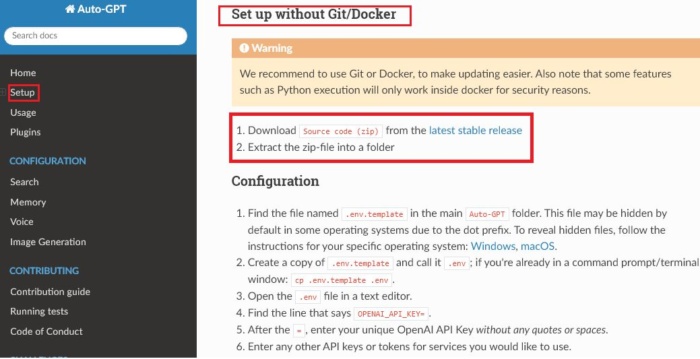
Once you click the link, you will be redirected to GitHub, where you can download the latest releases located at the bottom of the page as shown below:

Download in the file format of your choice (I used .zip), move it to the empty file you created on your system earlier, and extract the contents. You can delete the zip file once you’ve extracted them.
Open up the folder, scroll down until you find a file called “.env.template,” and right-click to rename it “.env.”
Open the “.env” file in a text editor like Notepad or another code editor. You should see something like this:
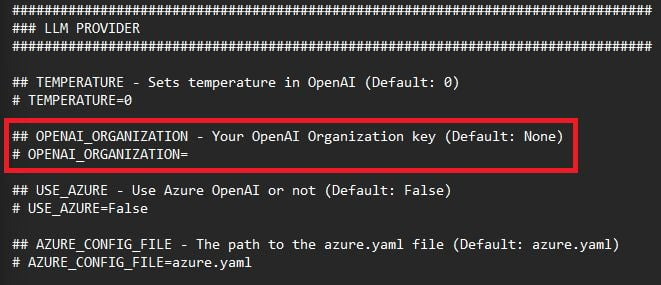
Next, you need to edit the file and give Auto-GPT access to something called an API key. You get one by creating an account on OpenAI’s website shown below:
API keys are like passwords Auto-GPT uses to access outside resources. Auto-GPT needs them to access the services and tools it needs to perform its tasks.
Once you generate a key, copy and paste it into the .env file (highlighted in red above). After adding your API key, you can run Auto-GPT by navigating to the folder you named initially (Auto-GPT in this example), right-clicking on it, and choosing “copy as path”:
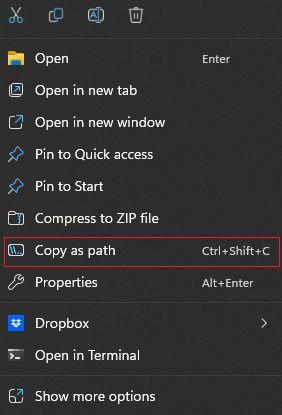
Then, open in Terminal, type “cd” add a space, and paste the path you just copied. Hit enter, and type the following command:
pip install -r requirements.txt
This will automatically install all the required libraries needed to run Auto-GPT. You’re almost there. The last step is to run the following command:
python -m autogpt
Et voila! Auto-G will now start on your system.
That’s it!
See? Installing Auto-GPT is easier than it might seem. By following the above steps, you’ll be ready to put Auto-GPT to use and elevate your efficiency.
Tips for Getting the Most Out of Auto-GPT
You should now have a clear picture of Auto-GPT’s potential. However, if you want to optimize its use, here are some tips to get the best from it.
- Give it clear instructions: The more specific you are, the better Auto-GPT’s response. For instance, don’t just tell it to create an article about buying a new TV. Instead, ask it to write you a detailed comparison between the three top models, along with features, benefits, pros and cons of each model, and pricing.
- Provide some context and examples: The more detail you give Auto-GPT, the more accurate your response.
- Edit and improve: Sometimes, the model might generate slightly incorrect responses. Refine the content further, like a skilled editor polishing a draft. Focus on grammar, spelling, flow, and fact check.
- Experiment with prompts and questions: You’ll get better results by exploring different angles.
- Give Feedback: If you encounter any issues or have suggestions, feel free to provide feedback! The more feedback Auto-GPT gets, the more it improves.
FAQs
Auto-GPT basically a clever computer program that can understand and learn from the language it’s given (machine learning).
It breaks a goal down into smaller subtasks and searches for information to reach its final aim. With the information it finds, Auto-GPT creates content to solve the goal you’ve set it.
You can access Auto-GPT from GitHub. You also need to install Python, Docker, or VSCode+devcoder, and register it with an API key via a paid Open AI account.
Launch Auto-GPT then give Auto-GPT a goal, then give it a prompt based around your goal.
For example, as a real estate agent, you might want help building your online presence.
For a prompt, you’d ask it to “write an article about digital marketing for real estate agents”.
Auto-GPT then works independently to gather the resources it needs to create your content and then it writes your article.
There are several ways you can install Auto-GPT. Here’s one method.
One method is to download the software via GitHub and double-click the installation file to launch it.
Wait for the set up wizard to appear, then follow the instructions. Click on install.
Once installed, either launch the software or find it in your apps/programs and launch it from there.
Conclusion
AI copywriting tools are everywhere, and Auto-GPT opens up a whole new world that goes far beyond that.
Whether you’re a content creator or marketer looking to streamline your workflow or a researcher diving into the depths of AI, you can see how it could transform your working day.
It could help you write that novel you’ve been dreaming of, take care of mundane daily tasks, and write code for you.
You can also use Auto-GPT for SEO by creating compelling content that keeps your audience on the page and increasing dwell time, which is a ranking factor.
That’s all a dream come true for many of us, especially marketers.
Is Auto-GPT perfect? No, but developing technologies rarely are.
Should you be experimenting with it? You can see its potential, so that’s up to you.
Use it wisely, and don’t forget the importance of fact-checking. Keep best practices in mind and, above all, consider its limitations.
What do you think about Auto-GPT? Will you use it in your business?
[ad_2]
Article link
